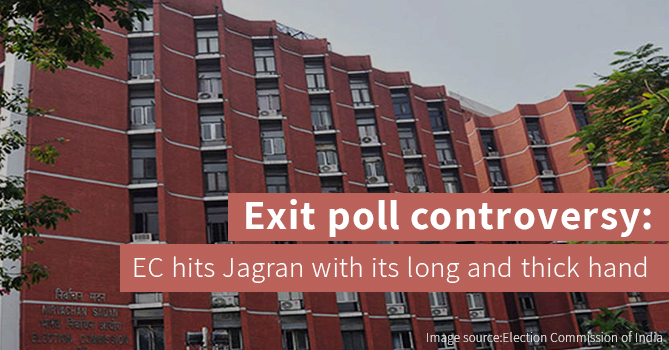In an attempt to prove their self-righteousness, some sections of the media do things which reek of motive and biasedness in their presentation. This is done with an aim to influence readers or audiences as much as the latter fail to see any hidden design in the publication of a news item, passed on as an issue of public interest.
It is what Jagran.com, a digital arm of Dainik Jagran, India’s largest circulated Hindi daily did by publishing exit polls on its web portal, soon after the first phase of election in Uttar Pradesh was over on February 11. The web portal did this in complete disregard of the Election Commission’s directives which proscribe, under Section 126 A(I) of the Representation of the People’s Act, publication of an exit poll in print or electronic media from February 4 to March 8.
Taking a firm action against the news outlet and the Resource Development International (I) Private Limited, which generated data for the said exit polls, the administration has begun investigation after lodging FIRs against them in all the 15 districts of Uttar Pradesh which went into assembly polls in the first phase.
The editor of Jagran.com, Shekhar Tripathi, along with other top management officials of the news outlet have been arrested. Though they have been granted bail as of now, but once the charges against them are proved in the court of law, they could face imprisonment of up to two years or be fined or both. This is the first incident of its kind in the country when a news organisation dared to take law on its sleeve, by going hammer and tongue with a data which, apparently, is meant to favour a party in the election.
The argument given by the management of the media outfit was that it was an inadvertent action and the report on exit poll was soon withdrawn from the portal when senior editorial staff of Jagran came to know about it. Though this is a subject of the investigation, but the news outlet should know that it cannot absolve itself by just arguing that the publication of exit polls on its website was not a deliberate move. It should know that sanctimonious rulings of the RP Act have been violated and that damage has been done to public trust in free and fair polling.
What’s the actual reason behind exit poll controversy?
Soon after the first phase of assembly polls in 73 seats in Uttar Pradesh got over on February 11, Jagran.com released the results of exit polls on its website. The data for the exit polls was generated by the RDI Private Limited, a United Kingdom-based consultancy firm which claims to have a presence in more than 20 countries of the world.
The agency claims to have generated data for the exit polls after interviewing 5,700 voters across 38 assembly seats. In those polls, the BJP was projected as the front-runner followed by the BSP and the SP-Congress alliance. It created brouhaha in a section of the media, and the EC taking cognizance of the matter slapped stringent punishment against the perpetrators of this violation under Section 126A of RP Act, 1951. And this it did to “uphold the law to ensure the smooth conduct of free and fair elections.”
How exit polls are conducted?
The exit polls are conducted when voters leave polling stations after casting their ballots on the election day. Any agency or a group which organises the exit polls, places its interviewer at a randomly selected place outside the polling station. Voters, who agree to participate in the exit polls, are handed out a questionnaire for filling. When a voter refuses to participate, the interviewer notes the gender and approximate age of that voter. The set of questions put before the voters include details such as who they voted for, what opinions they hold about the candidates, important issues and the demographic characteristics of the voter.
Are exit polls’ surveys accurate?
Before the exit polls’ results are published, the news organisations compare the results with early election polls and voting history. Later, with the help of statisticians and political experts the data is reviewed.
However, like other surveys, exit polls are also fraught with sampling errors. A majority of news outlets, including Dainik Jagran in their exit polls showed the BJP leading in the 2015 Bihar assembly election. When the actual results came in, the saffron party was in the third position after Lalu Prasad-headed Rashtriya Janata Dal and Nitish Kumar-led Janata Dal. Similarly, in the 2007 assembly polls in Uttar Pradesh, the BSP was written off as the party which could form its government.
Exit polls predicted a hung assembly, yet when the results were out, the BSP was the numero uno party, winning as many as 206 of the total 403 assembly seats in Uttar Pradesh.
Is curtailment of exit polls’ publication right decision?
When the contest is tough and elections are taking place in a phased manner, there are chances that exit polls may affect the voting behaviour of an individual voter. For example, if exit polls show the BJP in the lead in the first phase of polls, a large chunk of undecided voters during the next phase of polls may prefer to cast their ballots in favour of the party which is leading.
They may not cast their ballots in support of a party they originally thought they will vote for. Their apprehension that their ballots will turn waste if they vote for a party other than the one projected to lead in the fray, lead them to change their decisions at the last minute. This is where fair and transparent voting gets affected. Thereby, the Election Commission is right in its decision to put a curb on the publication of exit polls at a time when the election process is under way.
Conclusion
India is not the only country which has banned the exit polls. Several countries have done away with exit polls because these encourage voters to vote for a party or a candidate who is not their first choice; especially in countries where elections are not fought on the basis of proportional representation.
Therefore, exit polls affect considered decision making. In that way if exit polls happen to be wrong, voters may vote for a party which is not their first choice, hence, distorting the poll outcome.
Read More
Himachal Pradesh Assembly Election 2017
Gujarat Assembly Elections 2017






